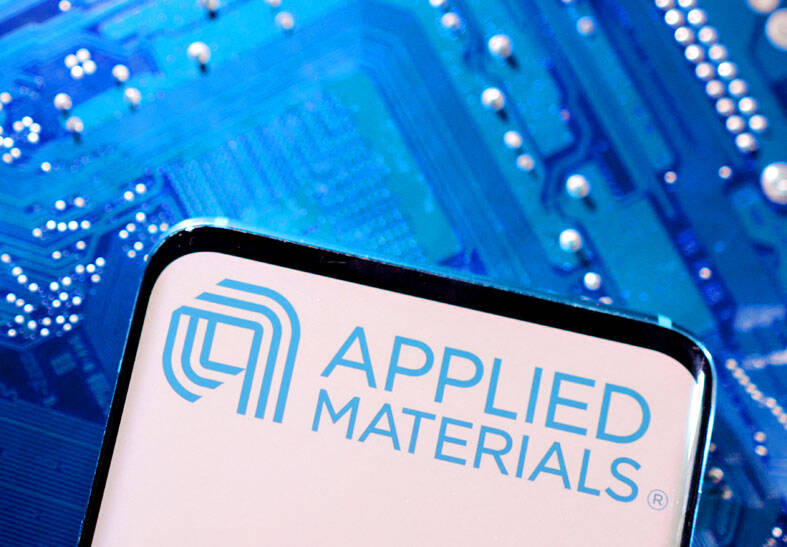Applied Materials Inc, the largest US producer of chipmaking gear, plunged in late trading yesterday after giving a disappointing sales and profit forecast, renewing concerns that the US trade dispute with China is weighing on demand.
Revenue would be approximately US$6.7 billion in the fiscal fourth quarter, the company said in a statement on Thursday.
Analysts had estimated US$7.32 billion on average. Profit would be about US$2.11 per share, excluding some items, compared with a projection of US$2.38.

Photo: Reuters
The company is seeing less demand from customers in China, Applied Materials CEO Gary Dickerson said in an interview.
It also faces delays in approval for exporting technology to that country, he said, adding that large customers are putting off some purchases in the face of prolonged negotiations around tariffs and other economic issues.
“It just creates a level of uncertainty,” Dickerson said.
The outlook sent shares of Applied Materials down as much as 12 percent. They had been up 16 percent this year before the report, closing at US$188.24 on Thursday.
In the third quarter, which ended July 27, revenue rose 7.7 percent to US$7.3 billion. Analysts had anticipated US$7.21 billion on average, according to data compiled by Bloomberg. Profit was US$2.48 per share, compared with an estimate of US$2.36.
Applied Materials’ customer ranks include some of the biggest names in the chip industry, such as Taiwan Semiconductor Manufacturing Co (台積電), Samsung Electronics Co and Intel Corp. Those manufacturers order gear well ahead of starting production, making Applied Materials’ forecasts a barometer for future demand.
The company said last week that it would participate in an Apple Inc plan to boost manufacturing in the US by spending more than US$200 million on a facility in Arizona. Applied Materials would also sell equipment to Texas Instruments Inc’s US factories to support Apple products.
“Applied Materials’ decision to be a core member of Apple’s ‘American Manufacturing Program,’ a drive to increase factory production within the US, could strengthen its position as a key supplier of chipmaking tools for advanced semiconductors used in iPhones,” Bloomberg Intelligence analyst Masahiro Wakasugi said in a note.
“The new administration is very focused on increasing semiconductor supply in the United States,” Dickerson said on Thursday. “We’re very positive.”
Last month, rival Lam Research Corp said revenue for the quarter ending in December would ease from the current-quarter levels, with Chinese customers potentially scaling back after a spending spree.
In a further sign of US-China tensions, Applied Materials was recently sued by Beijing E-Town Semiconductor Technology Co over what that company characterized as trade secret theft.
Still, Dickerson said the long-term demand outlook for computing power remains strong. Customers in China had significantly ramped up buying in recent years, and are now just digesting those purchases, he said.

On Ireland’s blustery western seaboard, researchers are gleefully flying giant kites — not for fun, but in the hope of generating renewable electricity and sparking a “revolution” in wind energy. “We use a kite to capture the wind and a generator at the bottom of it that captures the power,” said Padraic Doherty of Kitepower, the Dutch firm behind the venture. At its test site in operation since September 2023 near the small town of Bangor Erris, the team transports the vast 60-square-meter kite from a hangar across the lunar-like bogland to a generator. The kite is then attached by a

Foxconn Technology Co (鴻準精密), a metal casing supplier owned by Hon Hai Precision Industry Co (鴻海精密), yesterday announced plans to invest US$1 billion in the US over the next decade as part of its business transformation strategy. The Apple Inc supplier said in a statement that its board approved the investment on Thursday, as part of a transformation strategy focused on precision mold development, smart manufacturing, robotics and advanced automation. The strategy would have a strong emphasis on artificial intelligence (AI), the company added. The company said it aims to build a flexible, intelligent production ecosystem to boost competitiveness and sustainability. Foxconn

Leading Taiwanese bicycle brands Giant Manufacturing Co (巨大機械) and Merida Industry Co (美利達工業) on Sunday said that they have adopted measures to mitigate the impact of the tariff policies of US President Donald Trump’s administration. The US announced at the beginning of this month that it would impose a 20 percent tariff on imported goods made in Taiwan, effective on Thursday last week. The tariff would be added to other pre-existing most-favored-nation duties and industry-specific trade remedy levy, which would bring the overall tariff on Taiwan-made bicycles to between 25.5 percent and 31 percent. However, Giant did not seem too perturbed by the

TARIFF CONCERNS: Semiconductor suppliers are tempering expectations for the traditionally strong third quarter, citing US tariff uncertainty and a stronger NT dollar Several Taiwanese semiconductor suppliers are taking a cautious view of the third quarter — typically a peak season for the industry — citing uncertainty over US tariffs and the stronger New Taiwan dollar. Smartphone chip designer MediaTek Inc (聯發科技) said that customers accelerated orders in the first half of the year to avoid potential tariffs threatened by US President Donald Trump’s administration. As a result, it anticipates weaker-than-usual peak-season demand in the third quarter. The US tariff plan, announced on April 2, initially proposed a 32 percent duty on Taiwanese goods. Its implementation was postponed by 90 days to July 9, then